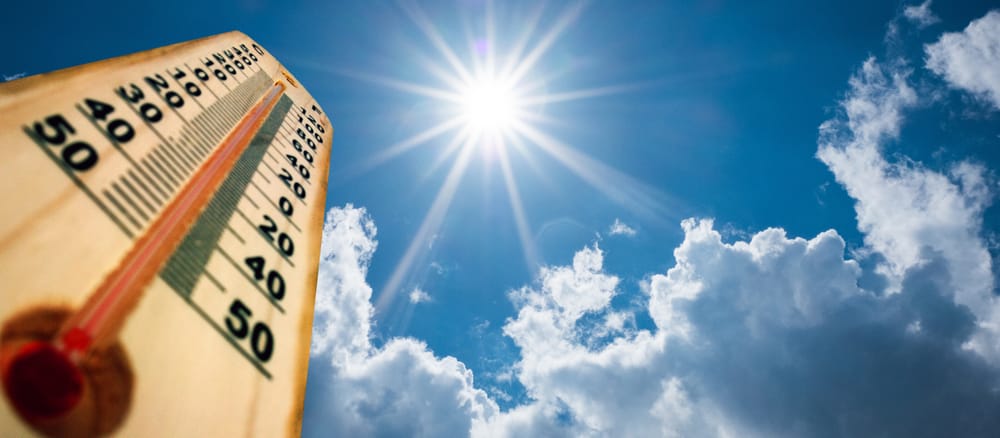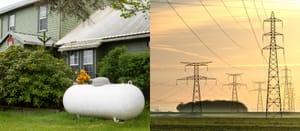As temperatures climb in the summer months, your propane tank isn’t just sitting pretty in the sun. Behind that rugged exterior, there’s some serious science happening—especially when it comes to pressure buildup. At Tankfarm, we’re here to keep your home running safely and efficiently, year-round. So, let’s talk about how heat affects your propane tank and what you can do to stay ahead of it.
The Science Behind Propane and Heat
Propane is stored as a liquid under pressure inside your tank. As the temperature outside rises, so does the temperature inside the tank. This leads to an increase in vapor pressure, which is the pressure exerted by propane gas on the walls of the tank.
In simple terms, hot weather = higher pressure inside the tank.
This isn’t necessarily a bad thing—the tanks are designed to handle it. But it’s essential to understand how it all works so you can protect your propane system and keep your household running smoothly.
Propane Tank Expansion: What You Should Know
Propane, like most gases and liquids, expands when heated. That’s why propane tanks are never filled to 100% capacity. Most are only filled to about 80–85%. This extra space is called “ullage,” and it’s there to accommodate the expansion of propane in the heat.
Here’s why this matters:
- Too much pressure can cause the safety relief valve to open, releasing propane gas into the air to prevent damage. This can be alarming, but it’s a sign your tank is doing its job.
- A tank that has been overfilled or exposed to excessive heat without adequate ventilation can pose a safety risk.
At Tankfarm, we utilize precision monitoring technology and adhere to modern safety standards to ensure your tank is never overfilled, regardless of the season.
Visible Signs Heat is Affecting Your Tank
You won’t need a thermometer to tell if heat is stressing your propane tank. Here are a few common indicators:
- Hissing noise or gas smell: This could mean your pressure relief valve has opened due to high internal pressure.
- Sweating tank: Condensation on the outside of the tank could be a sign of rapid temperature change inside.
- Unusual gas usage: Sudden drops in pressure may result in inconsistent appliance performance.
If you notice any of these signs, don’t panic—just contact our customer service team. We’re always here to help.
Tips to Protect Your Propane Tank in Hot Weather
Here’s what you can do to keep your propane system running safely and efficiently when the temperature rises:
1. Keep Your Tank Shaded (But Not Enclosed)
While propane tanks are built to withstand the elements, placing your tank in a shaded spot helps reduce direct heat exposure. However, avoid enclosing the tank or covering it with tarps that restrict airflow. Ventilation is key.
2. Clear the Area Around the Tank
Trim back grass, shrubs, or debris around your tank. Proper airflow helps dissipate heat, ensuring technicians can easily access it for service or delivery.
3. Schedule a Mid-Summer Checkup
A professional inspection ensures your tank, regulators, and connections are in good working order. A mid-season inspection is always a good idea if you’ve had extreme weather.
4. Know Where Your Shut-Off Valve Is
In rare cases of extreme heat and gas release, it’s helpful to know the location of the manual shut-off valve. Familiarize yourself with it so you can act quickly in an emergency.
5. Use Propane During Cooler Parts of the Day
Running major appliances early in the morning or late at night can reduce strain on your tank and system, especially during a heatwave.
The Tankfarm Advantage: Technology Meets Peace of Mind
Unlike traditional propane providers, Tankfarm integrates technology with every tank we install. Our remote tank monitoring means you don’t have to second-guess levels. You’ll know exactly how much propane you’re using, and we’ll automatically schedule your refills—so you never have to worry about running out.
Plus, you’ll always know exactly what you’re paying per gallon, no matter the season.
Frequently Asked Questions
Is it dangerous for my propane tank to be in the sun? No. Propane tanks are designed to withstand outdoor conditions, including exposure to the sun. However, keeping the tank shaded helps prevent excessive pressure buildup.
Can propane tanks explode in the heat? It’s extremely rare. Tanks are fitted with safety relief valves that release pressure safely if needed. Proper filling practices and remote monitoring drastically reduce any risk.
What should I do if I smell gas near my tank? Leave the area immediately and contact your propane provider. If you're a Tankfarm customer, call us right away—we’ll guide you through the next steps. Our support line is open 24/7 for emergencies – (855) 976-4141
Final Thoughts: Stay Cool, Stay Safe
Summer heat and propane tanks don’t have to be a dangerous combo. With the right knowledge, a few proactive steps, and the support of Tankfarm’s technology, you can enjoy the season with complete confidence.
Let us handle the pressure—so you can focus on your summer plans, not your propane tank.
Looking to switch providers before the next heat wave hits? Get started with Tankfarm today and see how easy, transparent, and reliable propane service can be.




